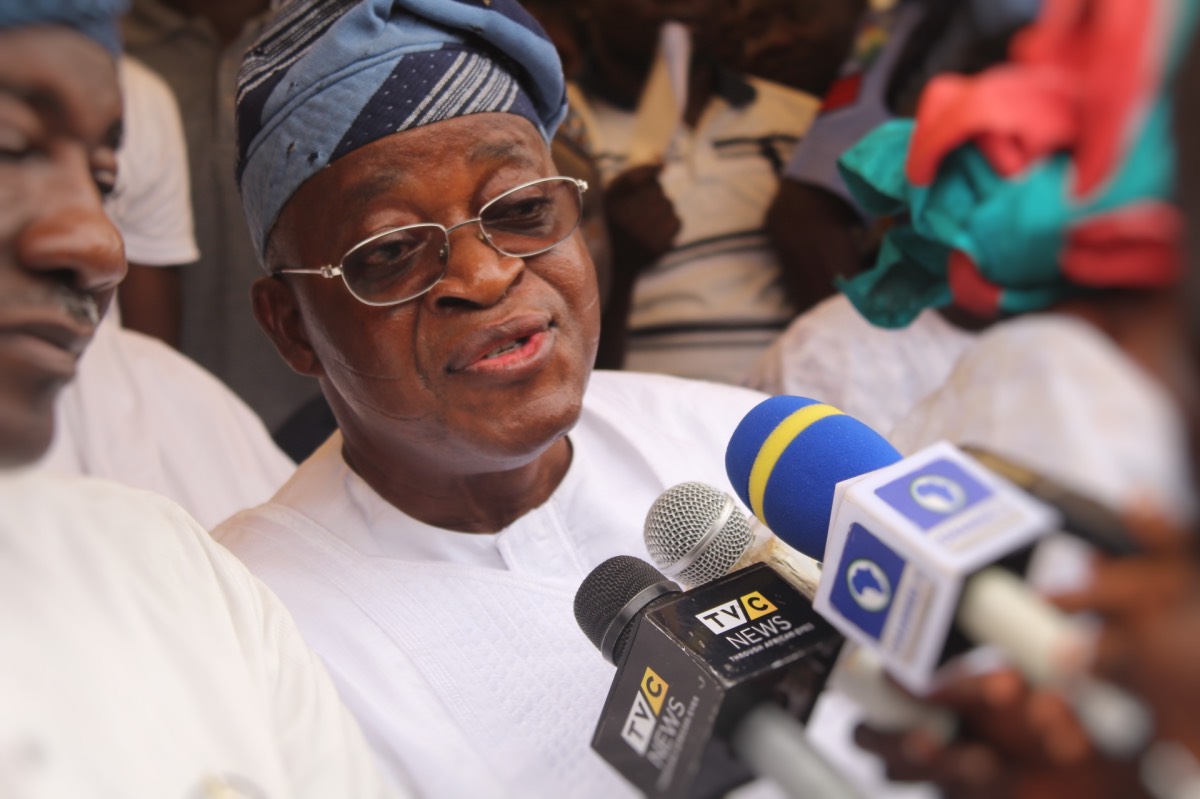Adegboyega Oyetola, the Osun state Governor, his party, the All Progressives Congress, APC, and the Independent National Electoral Commission, INEC, have urged the Supreme Court to dismiss the four appeals filed by the candidate of the People’s Democratic Party, PDP, in the last governorship election, Senator Ademola Adeleke.
Adeleke’s four appeals are challenging the May 9, 2019, judgments of the Court of Appeal, Abuja, which affirmed Oyetola’s election as the governor.
The Court of Appeal also set aside the majority judgment of the election tribunal, which had allowed Adeleke’s petition and declared him the winner of the election.
On Monday, June 17, 2019, a seven-man panel of the court, led by the Acting Chief Justice of Nigeria, CJN, Justice Ibrahim Muhammad, heard the appeals and chose July 5, 2015, for judgment.
On Monday, by agreement of lawyers in the appeals, the court took submissions from Onyechi Ikpeazu (SAN) for the appellant and Wole Olanipekun (SAN) for the 1st respondent (Oyetola) in respect of appeal marked: SC/553/2019.
The court said its judgment in the main appeal – SC/553/2019 – will be applied to two other similar cases, filed by Adeleke against the Court of Appeal’s decision in relation to the appeals filed by the Independent National Electoral Commission (INEC) and the APC, marked: SC/554/2019 and SC/555/2019.
The court also took arguments from Ikpeazu (for the appellant), Yusuf Ali (SAN) for INEC; Bode Olanipekun (SAN) for Oyetola and Olumide Olujinmi, for APC in relation to the fourth appeal, marked: SC/556/2019.
In their arguments, lawyers to the respondents – INEC, Oyetola and the APC – faulted the appeals and prayed the court to dismiss them for lacking in merit.
The respondents prayed the court to uphold the judgments as given on May 9, 2019, by the Court of Appeal in Abuja, which affirmed Oyetola of the APC as the winner of the governorship election held in September 2018.
In relation to the first set of appeals – SC/553/2019; SC554/2019 and SC/555/2019, Ikpeazu urged the court to set aside the judgments of the Court of Appeal and restore the majority judgment given in his client’s favour by the election tribunal.
In a counter-argument, Olanipekun, Ali and Olunijmi faulted the competence of the appeals and urged the court to dismiss them for lacking in merit.
They prayed the court to uphold the May 9 judgments given in favour of the respondents by the Court of Appeal.
In arguing the fourth appeal: SC/556/2019, Ikpeazu urged the court to set aside the two concurrent judgments of the election tribunal and the Court of Appeal, in which both courts rejected Adeleke’s request to void the supplementary election held after INEC declared the Osun governorship election inconclusive.
Ikpeazu said his client’s contention was that INEC lacked the powers to have cancelled elections in some pooling units and order a rerun.
He argued that the supplementary election was unnecessary because his client had won the election and met the constitutional requirement to be declared the winner.
Ikpeazu prayed the court to set aside the Paragraph 44 of the INEC’s Guideline on which basis the supplementary election was held, on the grounds that it conflicted with the Constitution.
Bode Olanipekun (SAN), who argued the fourth appeal for Oyetola, urged the court to disregard Ikpeazu’s contention that the supplementary election was unnecessary.
He argued that Paragraph 44 of INEC Guidelines was not in conflict with the constitution.
Oyetola’s counsel noted that Section 178(4) of the Constitution provides that the entire state is the constituency for a governorship election.
He argued that “where elections have not held in the entire state, the appellant cannot contend that he won the election, as against the 2nd respondent (Oyetola), who won the election as conducted across the whole of the state”.
He urged the court to dismiss the appeal for lacking in merit.
Lawyers to INEC and the APC argued in a similar vein, with Ali (for INEC) arguing that Ikpeazu’s submission on reliefs 8 and 9 of his client (Adeleke’s) petition, overlooked the fact that election tribunals are special tribunals with limited jurisdiction to determine whether somebody was properly returned in an election.
“The quarrel of the appellant is against concurrent findings of two lowers courts. There is no compelling reason to make this court interfere with the concurrent findings of the two lower courts,” Ali said.
Olujinmi urged the court to be guided by its earlier decision in the case of Faleke v. INEC 2016 8 NWLR, prt 1543 pg 61, in which this court affirmed the limited scope of the jurisdiction of the election tribunal.
He noted that even though Adeleke and his party, the PDP, are aware of this court’s decision in that case (Faleke case), but have failed to approach the court for departure on its position on that issue.
Other members of the panel that heard the appeals are Justices Olabode Rhodes-Vivour, Kumai Aka’ahs, Kudirat Kekere-Ekun, Amiru Sanusi, Paul Galunmje and Uwani Abbah-Aji.







